Related Research Articles

Laurel and Hardy were a British-American comedy duo act during the early Classical Hollywood era of American cinema, consisting of Englishman Stan Laurel (1890–1965) and American Oliver Hardy (1892–1957). Starting their career as a duo in the silent film era, they later successfully transitioned to "talkies". From the late 1920s to the mid-1950s, they were internationally famous for their slapstick comedy, with Laurel playing the clumsy, childlike friend to Hardy's pompous bully. Their signature theme song, known as "The Cuckoo Song", "Ku-Ku", or "The Dance of the Cuckoos" was heard over their films' opening credits, and became as emblematic of them as their bowler hats.

Harold Eugene "Hal" Roach Sr. was an American film and television producer, director, screenwriter, and centenarian, who was the founder of the namesake Hal Roach Studios.
The following is a complete list of the 220 Our Gang short films produced by Hal Roach Studios and/or Metro-Goldwyn-Mayer between 1922 and 1944, numbered by order of release along with production order.
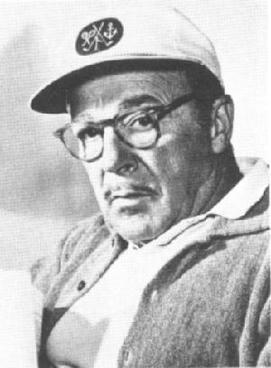
Gordon Douglas Brickner was an American film director and actor, who directed many different genres of films over the course of a five-decade career in motion pictures.

James Wesley Horne was an American actor, screenwriter, and film director.

A Chump at Oxford is a Hal Roach comedy film produced in 1939 and released in 1940 by United Artists. It was directed by Alfred J. Goulding and was the penultimate Laurel and Hardy film made at the Roach studio. The title echoes the film A Yank at Oxford (1938), of which it is a partial parody.
Fred Guiol, pronounced "Gill," was an American film director and screenwriter.
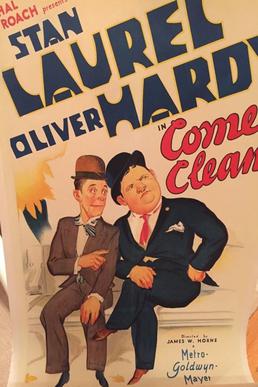
Come Clean is a 1931 American pre-Code short film starring Laurel and Hardy, directed by James W. Horne and produced by Hal Roach.
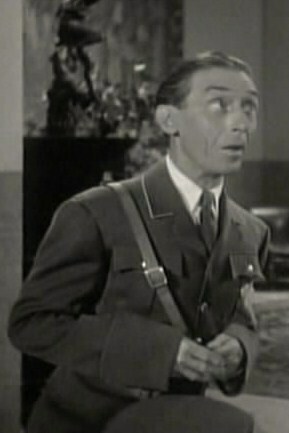
Charles Rogers was an English film actor, director and screenwriter, best known for his association with Laurel and Hardy. He was born in Birmingham, Warwickshire, England.

Tanks a Million is a 1941 American film directed by Fred Guiol. It was the first of Hal Roach's Streamliners, short films under an hour designed for the lower half of a double feature. The two leading characters, whiz-kid sergeant Doubleday and his rival Sergeant Ames, would go on to feature in seven more films, though the series has no overall title.
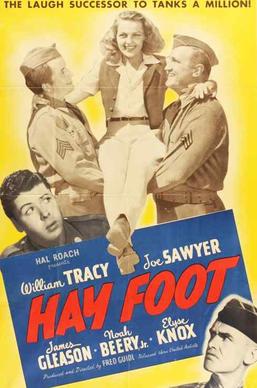
Hay Foot is a 1942 American military comedy, a sequel to Tanks a Million which brings back most of the characters from that film. The two leading characters, sergeant Doubleday and his rival Sergeant Ames, would go on to feature in six more films.

Abroad with Two Yanks is a 1944 American comedy film directed by Allan Dwan and starring Helen Walker, William Bendix and Dennis O'Keefe as the title characters. It was Bendix's third and final role in a film as a US Marine and the first of Dwan's three films about the United States Marine Corps.
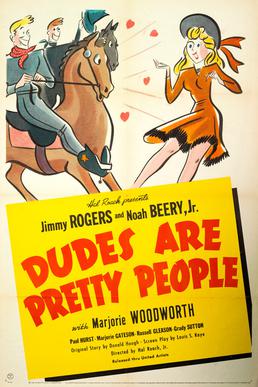
Dudes are Pretty People is a 1942 film and the first Western entry of "Hal Roach's Streamliners", approximately 50-minute comedic movies, directed by Hal Roach, Jr. and starring Jimmy Rogers as "Jimmy" and Noah Beery, Jr. as "Pidge Crosby". The featurette was written by Louis S. Kaye from a story by Donald Hough. The running time for this film is 43 minutes and the picture was released in March 1942. The film had two Streamliners sequels, Calaboose and Prairie Chickens, both released in 1943 with Rogers and Beery in the same roles.

Calaboose is a 1943 American Western film directed by Hal Roach Jr. It stars Jimmy Rogers, Mary Brian and Noah Beery Jr.

Prairie Chickens is a 1943 American Western film and a sequel to Dudes are Pretty People (1942) and Calaboose (1943), Western films from "Hal Roach's Streamliners", a series of approximately 50-minute comedic movies, in this case directed by Hal Roach, Jr. and starring Jimmy Rogers as "Jimmy" and Noah Beery, Jr. as "Pidge Crosby". The supporting cast features comedy veteran Raymond Hatton, who had been an unofficial comedy partner with Beery's uncle Wallace Beery in several pictures two decades earlier, and the featurette's running time is 48 minutes.
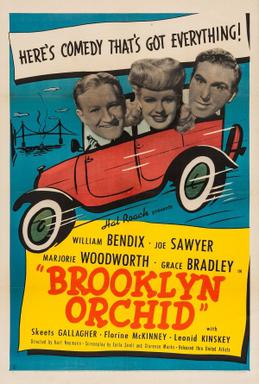
Brooklyn Orchid is a 1942 American comedy film directed by Kurt Neumann and written by Earle Snell and Clarence Marks that was one of Hal Roach's Streamliners. The film stars William Bendix, Joe Sawyer, Marjorie Woodworth, Grace Bradley, Richard "Skeets" Gallagher, Florine McKinney and Leonid Kinskey. The film was released on January 31, 1942, by United Artists.
About Face is a 1942 American comedy film directed by Kurt Neumann and written by Eugene Conrad and Edward E. Seabrook. The film is the third of the Hal Roach's Streamliners Army film series with stars William Tracy and Joe Sawyer. The film also features Jean Porter, Marjorie Lord, Margaret Dumont, Veda Ann Borg and Joe Cunningham. The film was released on April 16, 1942, by United Artists.
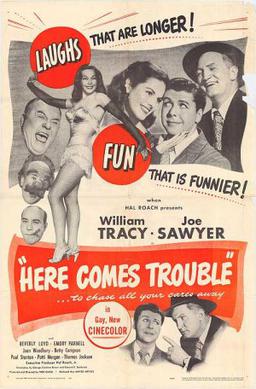
Here Comes Trouble is a 1948 American comedy film in the Hal Roach's Streamliners series. It was produced and directed by Fred Guiol and written by George Carleton Brown and Edward E. Seabrook. The film stars William Tracy, Joe Sawyer, Emory Parnell, Betty Compson and Joan Woodbury. It was released on March 15, 1948 by United Artists.
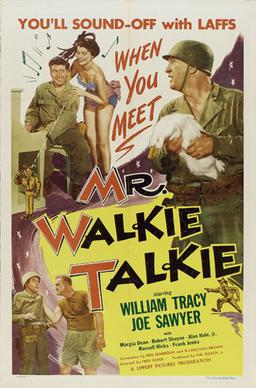
Mr. Walkie Talkie is a 1952 American comedy film directed by Fred Guiol and starring William Tracy, Joe Sawyer and Margia Dean. Released by Lippert Pictures, it is the final film of the Doubleday and Ames army comedy films originally produced by Hal Roach with the pair returning for service in the Korean War.
References
- 1 2 King, Molloy & Tzioumakis 2012, p. 53.
- ↑ Bosley Crowther review: "'Tanks a Million', a Hal Roach Comedy About Army Life as It Isn't, at Loew's Criterion", The New York Times, October 9, 1941.
- ↑ Leonard Maltin, The Great Movie Shorts: Those Wonderful One- and Two-Reelers of the Thirties and Forties, Crown, 1972, ISBN 978-0517504550, p. 5.
- ↑ Scott MacGillivray, Laurel & Hardy: From the Forties Forward, iUniverse, 2009, ISBN 978-1440172373, p. 2.
- ↑ Variety, "UA Orders Hal Roach to Tack On Footage to Laurel-Hardy 4-Reelers", Nov. 15, 1939, p. 2.
- ↑ Ibid.
- ↑ Hal Roach to authors Bernard Rosenberg and Harry Silverstein, published in The Real Tinsel (Macmillan, 1970), p. 22.
- ↑ Ward 2006, pp. 120–121.
- ↑ MacGillivray, p. 4.
- ↑ Barnes, Bart (1992-11-03). "MOVIE GREAT HAL ROACH DIES". Washington Post. ISSN 0190-8286 . Retrieved 2017-12-06.
- ↑ Hal Roach to Rosenberg and Silverstein, p. 23.
Sources
- King, Geoff; Molloy, Claire; Tzioumakis, Yannis, eds. (2012). American Independent Cinema: indie, indiewood and beyond (1st ed.). Abingdon-on-Thames: Routledge. p. 53. ISBN 978-0415684293.
- Maltin, Leonard (1972). The Great Movie Shorts: Those Wonderful One- and Two-Reelers of the Thirties and Forties. New York City: Crown Publishing Group. p. 5. ISBN 978-0517504550.
- MacGillivray, Scott (2009). Laurel & Hardy: From the Forties Forward. New York: iUniverse. pp. 2, 4. ISBN 978-1440172373.
- Ward, Richard Lewis (2006). A History of the Hal Roach Studios. Carbondale, Illinois: Southern Illinois University Press. pp. 120–121. ISBN 978-0809327270.